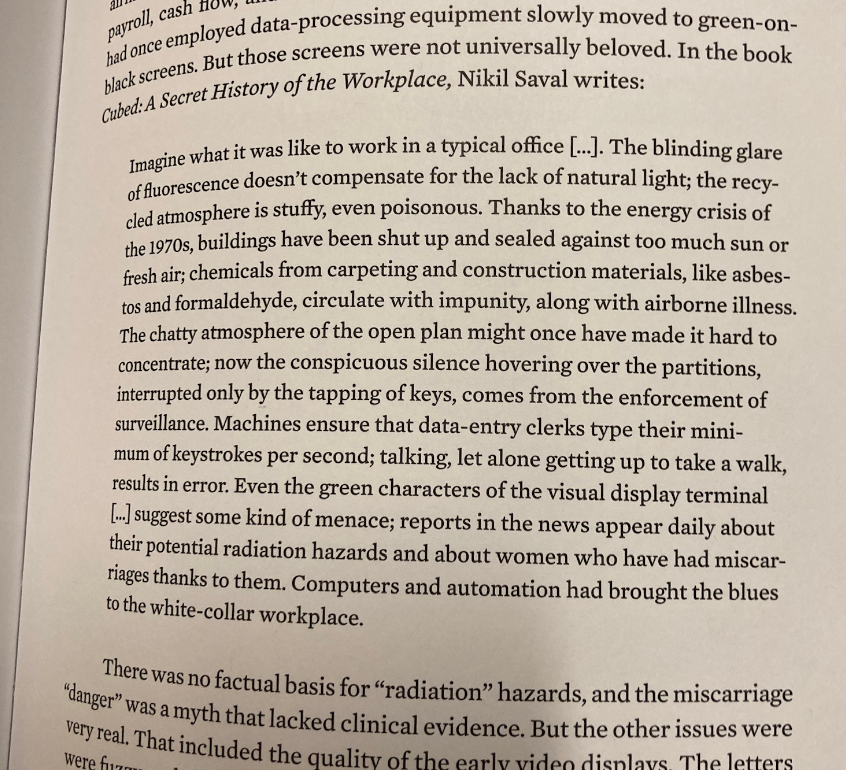An Escapologist’s Diary: Part 79. 2024 Review.

Splosh! Time for an annual report to my imaginary shareholders.
But first an excerpt from last year’s report:
2024 will not be as fruitful as 2023 was. It can’t be.
Ahem. Well, that’s not what happened.
Risks and High Jinks

I spotted a copy of The Phantom Tollbooth by Norton Juster on my in-laws’ bookshelf. No offence to Juster, but it was the intro from Maurice Sendak — he of Where the Wild Things Are — that caught my imagination.
Sendak wrote this in 1996:
[The Phantom] Tollbooth is a product of a time and a place that fills me with fierce nostaliga. It was published in New York City in 1961. … [we] were all swept up in a publishing adventure full of risks and high jinks that has nearly faded from memory. There were no temptations except to astonish … Simply, it was easy to stay clean and fresh, and wildly ourselves — a pod of happy baby whales flipping our flukes and diving deep for gold.
We have to be careful with this kind of “fierce nostalgia,” to think that the past was necessarily better than things are today. But I know what he means. I was talking to Friend Andy the other day, who fondly remembers the indie publishing and queer and dot-com cultures around the Bay Area of the time Sendak wrote the words above.
In turn, I’m nostalgic for the Britpop years of England in 1997-2002. I woulnd’t want to go back, but I do lament the savage siphoning away of “adventure” and “risk and high jinks” from our culture that felt present in the atmosphere of that time.
A recent YouGov poll suggests most people would rather live in the past than in the future. It does seem that the 20th Century was full of life while our own is preoccupied, understandably, with extinction. That’s not how it was in Sendak’s swinging ’60s! Everybody wanted to know about the future back then, couldn’t wait to get here.
Well, I say this: never mind.
Never mind if the future looks bleak.
If a bomb drops on you, you almost certainly won’t know about it.
Insulate yourself to the news. Live as ethically as you can, but also as well as you can. From our own hererotopias, let us have, in Sendak’s terms, “adventure” and “stay clean and fresh, and wildly ourselves” no matter what.
If it’s harder to do that in the world of Musk and Deliveroo and forest fires than it was in the days of Maurice Sendak (’60s NY), Friend Andy (’90s San Francisco), and Blur (millennial UK) then there’s even fewer “temptations except to astonish.”
So. Let’s astonish.
We can do it through our art, our interactions with each other, and by how we live.
*
Letter to the Editor: We Make Choices
To send a letter to the editor, simply write in. You’ll get a reply and we’ll anonymise any blogged version.

Reader G writes:
Dear Robert,
I just wanted to write a quick missive to thank you for The Good Life for Wage Slaves. I had to ration myself reading time on it, as I have to with all your Escapological material! There were two stand-out things for me.
Firstly the use of Wikipedian cats as a pseudonymising tool. It just went to add that extra spoonful of ridiculousness which your situation (and had the bonus benefit of teaching me the glorious tale of Catmando – before I read his page I’d been pronouncing it like ‘commando’, which fitted the human boss persona perfectly).
Second was the idea of buying a violin with no plan/need to make what society so unreasonably deems a good noise. It reminded me that I want to take up the trumpet, having been so crap at it at school that I was moved over to the (what-the-hell-is-a) euphonium, which I hated. So I might just take the plunge. It also reminded me of my favourite Peter Cook/Dudley Moore sketch, so all the better:
My own Escapological path is long and rambling. It doesn’t even end with me quitting work altogether (yet!). But I’m now in a job that I enjoy (and has an excellent barrier between work and leisure), and which required an Escapological leap to reach. Nevertheless, your latest book will remain an essential guide to managing work to the betterment of leisure time. The journey continues!
Just before your book arrived, I was reading another one that might interest you: Affluence Without Abundance by James Suzman. I’ve long been both interested (from an idler’s point of view) and sceptical of the ‘original affluent society’ idea, but the author of this book is both insightful and balanced – he’s not trying to prove any ‘primitivist fantasy’.
The book’s portraits of different communities in an area of southern Africa contrast those who live the older hunter-gatherer lifestyle (without abundance) with those who strive as hard as possible, and are farmers (or unemployed). Apparently it was with the agricultural revolution that it all went wrong! It commits us to much more work than letting the food raise itself.
Still, Suzman shows that the difference between idling and striving can largely be one of attitude and/or choice. In the above book, people on both sides of the divide can live cheek-by-jowl. As Escapologists we know that we make choices and priorise in order to live the life we want. The book shows that, though there are pressures to earn, stash, or aspire, and there are temptations (the greatest to the subjects of the book seems to be alcohol), both lifestyles are there for the adopting, if you know how to choose.
Thanks again for publishing the manuals.
Best wishes,
G
*
The Good Life for Wage Slaves is available from our online shop, along with Issue 16 and our print or digital subscription packages.
Cubed
At the newspaper I worked for in the early 2000s, I remember a moment of great excitement when we moved into new premises. It was the dawning of a new age. Instead of the usual dreary desk arrangement, with time wasted in long conferences and senior executives sequestered in status-enhancing glass boxes, a revolutionary new newsroom would channel the dynamic work-flows of the 24-hour digital future. There was excited talk of “vertical silos” and a lot of nodding.
This is from a 2014 book review of the aforementioned Cubed: A Secret History of the Office by Nikil Saval.
Saval notes, “in news stories the word ‘cubicle’ rarely appeared in dignified solitude; instead it was prefaced with some inevitable epithet: ‘windowless’ or ‘dreary’, ‘cubicle warrens’, ‘bull pens’ or ‘infernos’. People laboured in ‘cube farms’ and were stuck next to each other in six-by‑six standard sets known as six-packs. Douglas Coupland’s epoch-defining book, Generation X, coined the phrase ‘veal-fattening pen’.”
and
Saval persuasively argues that, from the rise of the clerking classes in the 19th century and early 20th century onwards, a key ideological feature of white-collar work has been that the worker is individualistic and self-directed; believing he (the exception for she, unfortunately, needs little rehearsal) might be a clerk now, but with patience and application there’s nothing to stop him one day sitting where the boss sits. That idea, much more often than not, has turned out to be pure vapour: you fall asleep dreaming the American Dream and you wake up as Dilbert.
*
Issue 17 has sold out! But never fear, it’s still available in digital formats singly or bundled. There’s also a few copies of Issue 16 — perhaps our best work to date — still gettable in print.
The Tapping of Keys
My good friend Tim recently read Shift Happens, a book about computer keyboards.
I mentioned this to some other friends, bracing myself for a comment along the lines of “blimey, that’s a bit niche,” but one of them said, thoughtfullly, “I should really read a book about keyboards.”
So who knows what’s going on out there? Or maybe this is just what my friends are like.
Anyway, Chumrad Tim shares a quote from said book with us. It invites us to consider the differences between pre- and post-War offices:
…the conspicuous silence hovering over the partitions, interupted only by the tapping of keys, comes from the enforcement of surveillance.

The full quote, really, doesn’t come from Shift Happens but from another book called Cubed: A Secret History of the Workplace by Nikil Saval.
Computers and automation had brought the blues to the white-collar workplace.
*
Issue 17 has sold out! But never fear, it’s still available in digital formats singly or bundled. There’s also a few copies of Issue 16 — perhaps our best work to date — still gettable in print.
Pirate Captain Jim
“Pirate Captain Jim” is a glorious work avoidance poem by Shel Silverstein, who kinda looked like a pirate himself.
“Walk the plank,” says Pirate Jim.
“But Captain Jim, I cannot swim.”
“Then you must steer us through the gale.”
“But Captain Jim, I cannot sail.”
“Then down with the galley slaves you go.”
“But Captain Jim, I cannot row.”
“Then you must be the pirate’s clerk.”
“But Captain Jim, I cannot work.”
“Then a pirate captain you must be.”
“Thank you, Jim,” says Captain Me.

*
Issue 17 of New Escapologist has sold out! But don’t worry, it’s still available in digital formats singly or bundled. There’s also a few copies of Issue 16 — perhaps our best work to date — still gettable in print.
An Escapologist’s Diary: Part 78. Travel in Pictures.

This series of posts — starting with a 2009 escape and running to the present moment — answers the question “what would I do all day without a job?” in a sarcastic level of deatil.
It’s the end of 2024 and I’ve been on the road for almost two months. Here’s where I’ve been, in tantalisingly (pointlessly?) context-free pictures.
Letter to the Editor: Does the Answer Really Lie in More Work?
To send a letter to the editor, simply write in. You’ll get a reply and we’ll anonymise any blogged version.

Dear Rob,
During a recent delve into my journals, I was reminded that in 2010 we were engaged in some email correspondence about giving up shopping. I was in a wonderfully free period of life between graduating from University and starting anything else and was writing a blog about resisting consumerism.
Shortly after this I was offered a full time job [for a large charity]. Jobs in the charity sector, especially in campaigning organisations, are dangerous because they give the appearance of doing something worthwhile and politically radical while trapping you at a desk for 40 hours a week (or more, because when you’re making the world a better place it feels morally incorrect to stick to your contracted hours.)
Promotions and raises, instead of bringing forward my escape, enabled more tattoos, better coffee, tickets to see bands that other people had heard of too. I’ve always called myself an anti-capitalist but capitalism got its claws into me anyway. Punk is an aesthetic like any other, marketed to me on Instagram via adverts for purple hair dye and tattoo brightening cream.
As I enter the second half of my thirties, I find myself increasingly tired of it all. Working for a charity seems, at best, paternalistic — full of white middle-class people who think they know best about the lives of the less fortunate — and at worst complicit in a system of widening inequality and climate crisis by letting governments off the hook by providing services no longer sufficiently funded by the state.
Much better, I thought, to be fixing those inequalities at the root causes. So I ran as candidate in the [redacted] elections. The only party I could stomach joining was the Green Party, so I didn’t win, but I did well enough to be asked to stand as a local councilor. The amount of work that would entail makes my chest tighten in panic.
And I’m wondering, does the answer really lie in more work? Is the world going to be made better by all this hustle? By attending endless meetings in our spare time? By being so exhausted that we mindlessly consume terrible food and bad TV and the endless scroll of social media?
A few weeks ago I picked up a copy of The Way Home by Mark Boyle in a charity shop. Reading this, alongside the return of New Escapologist (and especially the piece about Henry Gibbs) has me thinking of escape again.
I’ve already stood down from one of the trustee boards I’m on, and started ignoring calls for volunteers on Whatsapp groups. I’ve stopped posting on social media. I’m even thinking of moving out of London and planting a veg garden.
K
*
In Issue 17, we’re running an excerpt from After Work by Helen Hester and Nick Srnicek. They make a distinction between freedom through work and freedom from work, which is an important one.
Your point about punk being an saleable aesthetic is a good one. There’s a book about this called The Rebel Sell by Joseph Heath. When I interviewed him for Issue 9, he seemed to think this was all so obvious, that everyone can see through the claptrap. But is it? At that time I still believed in at least some of the punk aesthetic being symbollic of actual values, that someone with blue hair or some tats might be my tribe. Which is ironic really because in punk terms I look like a real square. But anyway, it’s a good point. Punk is for sale.
I hope you do what’s right for you, K. I won’t advise you to do anything because only you can know your full situation, but slowing down and operating far from the capital are things I’ve always put stock in and they seem to work for me. At least doing less (or just hanging out instead of working) doesn’t burn any fossil fuels. E.F. Schumacher wrote in Small is Beautiful (1973) that we should have done the work in the 1960s and 70s: used the finite “capital” or starter loan of fossil fuels to create sustainable alternatives. But we didn’t. Whatever happens now, I’m not sure that panicking about this failure is entirely productive.



